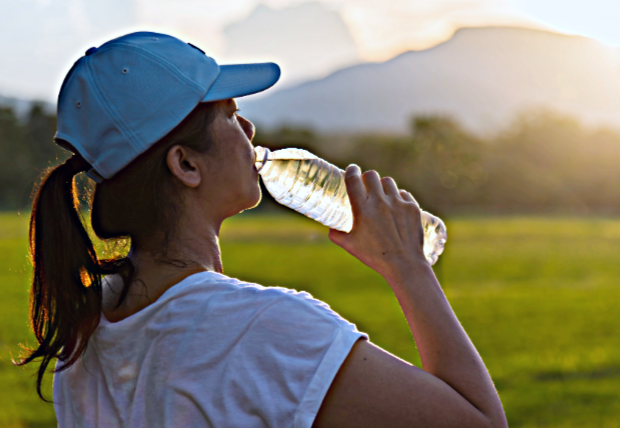Runner Hydration: Top Strategies

How Much Water Do You Really Need?
As a physical therapist and a runner, I’ve had my fair share of conversations about hydration—often mid-run, when someone realizes they forgot their water bottle… again. We’ve all heard the advice to “drink more water,” but what does that actually mean when you’re logging miles in the heat, on trails, or training for your next big race?
Proper hydration is about more than just quenching your thirst. It can impact your energy levels, performance, recovery, and even your risk for injury. So let’s break down how much water runners really need—and how to get it right.
Runner Hydration – Why it Matters
Running increases fluid loss through sweat and respiration. Even mild dehydration—just 2% loss of body weight in fluids—can impair performance by reducing endurance, increasing perceived effort, and affecting thermoregulation.
For runners, staying hydrated isn’t just about comfort—it’s about safety and performance.
Daily Hydration: Start With a Solid Baseline
The foundation of any hydration strategy starts with what you do off the run.
Most adults should aim for about half their body weight in ounces of water per day (so a 140-pound person would target around 70 ounces daily), but runners often need more due to sweat losses.
Pro tip: Your urine color is a simple hydration gauge—aim for a pale yellow. If it’s consistently darker, it might be time to bump up your intake.
Pre-Run Hydration: Prepare, Don’t Overdo
Heading out for a run? You don’t need to chug a gallon of water beforehand, but arriving at the starting line well-hydrated is key.
What to do:
- 2–3 hours before running: Drink 16–20 ounces of water or a sports drink.
- 15–30 minutes before: Sip another 4–8 ounces if you’re feeling dry.
Avoid overhydrating, which can dilute sodium levels in the blood (a condition called hyponatremia).
During the Run: Match Intake to Conditions
How much water you need during your run depends on several factors: intensity, duration, weather, and how much you sweat.
Here are some general guidelines:
- Short runs (<60 minutes): You might not need anything if you’re already well-hydrated.
- Longer runs (>60 minutes): Aim for 4–8 ounces every 15–20 minutes.
- Hot/humid days: Consider electrolyte-enhanced fluids to replace sodium and other key minerals lost in sweat.
Sweat rate testing can help personalize this further. One easy version: Weigh yourself before and after a run. Every pound lost = ~16 ounces of fluid you’ll need to replace.
Post-Run: Rehydrate and Recover
After your run, rehydration helps kickstart recovery. As a rule of thumb, drink 16–24 ounces of fluid for every pound of weight lost during your workout.
Rehydration drinks with sodium or a salty snack can help the body retain more of the fluid you consume.
Tip: If your run was especially long or in hot conditions, include potassium-rich foods (like bananas or sweet potatoes) and magnesium (leafy greens, nuts) to restore electrolyte balance.
What About Electrolytes and Sports Drinks?
Electrolytes—especially sodium—are critical during longer efforts, particularly in hot weather. If you’re sweating heavily or running longer than an hour, consider:
- Electrolyte powders added to water
- Salt tablets/pills if you don’t find a powder you like
- Whole-food options like coconut water or fruit juice with a pinch of salt
Not all hydration products are created equal, so check the labels—especially for sodium content. Aim for 300–700 mg of sodium per liter of fluid for optimal replacement during exercise.
Want to Know What You Need?
Hydration is deeply individual. Your sweat rate, running form, training load, and even gut tolerance all play a role in what works best for you.
At Rehab 2 Perform, we offer a Running Performance Analysis that goes beyond gait and mechanics. Our team evaluates mobility, strength, and training patterns to give you a holistic view of how to improve performance—safely and sustainably.
Not sure if you’re fueling or hydrating right for your goals? We can help you fine-tune those strategies so you can keep progressing without setbacks.
Final Thoughts
Hydration for runners isn’t one-size-fits-all. From hot-weather long runs to chilly morning 5Ks, your needs will shift with your environment and your body.
By dialing in your hydration before, during, and after your runs—and understanding what your individual body requires—you’ll feel stronger, recover faster, and stay injury-free. And if you’re ready to go deeper, check out our Running Performance Analysis at Rehab 2 Perform. It’s the perfect next step to help you run smarter, not just harder.
Happy running!
-Dr. Katie Woelfel, DPT, OCS | Performance Physical Therapist

Fitness Focused Physical Therapy
Rehab 2 Perform is a leading physical therapy and sports rehabilitation company dedicated to helping clients achieve optimal performance in their daily lives, whether they are athletes, weekend warriors, or individuals recovering from injury. With a team of highly skilled professionals across 12 state-of-the-art locations, Rehab 2 Perform offers a personalized, evidence-based approach that emphasizes active rehabilitation and functional fitness. Find a Location near you, or Schedule Here.
We accept all major insurances, including Tricare, VA Community Care, and the Johns Hopkins Healthcare Network!
